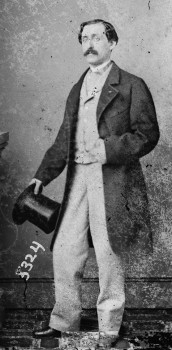Louis Moreau Gottschalk (1829–1869) was born in New Orleans to a German-Jewish father and a Creole mother who was an accomplished singer. At an early age he showed musical ability, and went off to Europe to study the piano. But when he applied for admission to the Paris Conservatory, he was rejected without an audition, the director of classes explaining that his school was no place for someone from America, “the country of railroads but not of musicians.”
Gottschalk managed to find a teacher in Paris, was befriended by Hector Berlioz, and toured Europe to acclaim. At the age of sixteen he played for Chopin, who was duly impressed, predicting Gottschalk would “become the king of pianists.” In 1853, Gottschalk made his American debut at Niblo’s Garden in New York City, then toured the United States, Mexico, and South America. He was the first important American composer, was the first American musician with a national and international reputation, was the first from his country to popularize concert music, and was a brilliant pianist who shone playing his own very difficult compositions. Gottschalk’s music combined Creole, black, minstrel (white performers of “blackness” in exaggerated costumes and blackface make-up, supposedly for comedic effect, but relying on racist derision and stereotyping at its core, from the mid-19th century well into the 20th century), South American, Spanish, mariachi, West Indian, and Cuban sounds.
Though music critics were divided on Gottschalk’s talents, his popularity in America was enormous, rivaled only by that of Jenny Lind, the Swedish Nightingale. At his concerts, he always wore white gloves, then dramatically removed them on stage one finger at a time. Female admirers would the storm the stage, tearing the gloves to pieces as they fought for souvenirs. A showman and a Don Juan, Gottschalk was fluent in five languages. Gottschalk, who never married, was run out of San Francisco for his romantic escapade, and was threatened by men throughout the country who believed that he had used his good looks and matinee-idol status to corrupt the morals of their wives.
A committed Unionist and abolitionist, Gottschalk toured Civil Was camps, playing for the troops. On November 24, 1869, while leading 600 musicians in a performance of his own composition, Morte!! (She is Dead), he fell ill, and succumbed a month later.
–from Brooklyn’s Green-Wood Cemetery, New York’s Buried Treasure by Jeffrey I. Richman
